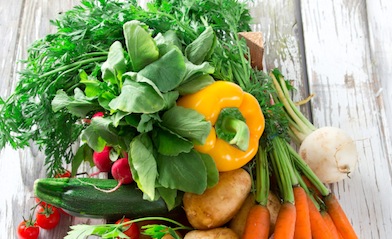As an oncology nutritionist, I meet with people throughout the stages of treatment, recovery, and survivorship. The relationship between food and cancer is an ever-developing and popular field, and because of this, the people I meet with tend to have many questions. The following are a few of the most common questions I’m asked.
Having a chemotherapy regimen prescribed is an incredibly daunting experience, and I’ve noticed that patients are often left with practical questions about leading their day-to-day lives during treatment periods. Amongst these concerns: do I need to change my diet? The answer to this question depends largely on the type of cancer being treated and the regimen prescribed, as diet changes should correspond with whichever treatment side effects are expected. My basic recommendation is to follow a regular, healthy diet, and manage nutritionally relevant side effects as they arise. To be prepared, it’s always a good idea to meet with a registered dietitian before treatment to determine whether you need to follow a particular diet right way (neutropenic, for example), learn some simple diet alterations for potential issues, and get written material to bring home with you. (You can also use this site to have a few good recipe ideas on hand.) I typically recommend following a bland/simple diet for one or two days leading up to and following infusion. (Most chemotherapy regimens have potential gastrointestinal side effects, such as nausea, diarrhea, or constipation, and eating a bland diet for the days surrounding infusion can help to lessen the extent of these effects.) Similarly, a tip I’ve learned from patients is to avoid favorite foods on the day of infusion. This helps to deter the formation of any negative associations with foods that you love to eat.
Over the past several years, cancer treatments and medicinal management of side effects have really been optimized, and sometimes, people are able to get through these treatments without feeling particularly ill or needing to change their diet at all. For this reason, I encourage patients to decrease anticipation of negative side effects. Not uncommonly, anticipation alone can cause the side effect (“anticipatory nausea” is a real thing). Sometimes too, an expectation of poor appetite or weight loss leads to overeating and unhealthy weight gain. (Interestingly, for some cancers and their treatments, it’s more common to gain weight than to lose it.)
It might be helpful to think of treatment periods as a time when you want to give yourself the best care possible – in a way, you want to create a spa-like environment for yourself. Recruit friends and family members to help. Give yourself nourishing, healthy, and comforting foods, exercise gently and regularly, get plenty of sleep, rest when fatigued, and try to rid yourself of burdensome stressors. For diet, I recommend a plant-based or Mediterranean style: rich in non-starchy vegetables and fruit, moderate but consistent amounts of healthy fats, moderate to limited intake of good quality animal products, and limited amounts of starch.
Alexandra Rothwell, MPH, RD, CSO, CDN
Alexandra Rothwell is registered dietitian, with a specialization in oncology nutrition. She currently works at Mount Sinai’s Dubin Breast Center, in New York City, primarily consulting with breast cancer patients throughout treatment and survivorship. Previously, she worked with patients of head and neck cancer, bone marrow transplant, gastric, colon, and prostate cancer, among other malignancies. She has completed her Masters of Public Health from Mount Sinai’s Ichan School of Medicine and received her nutrition education from New York University.
